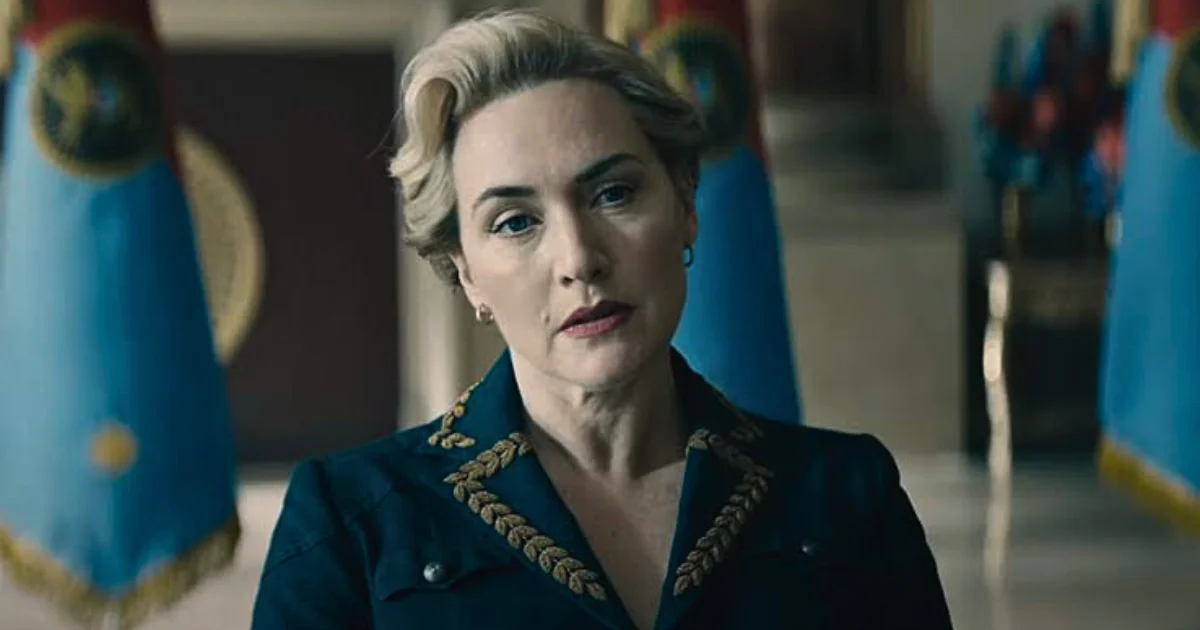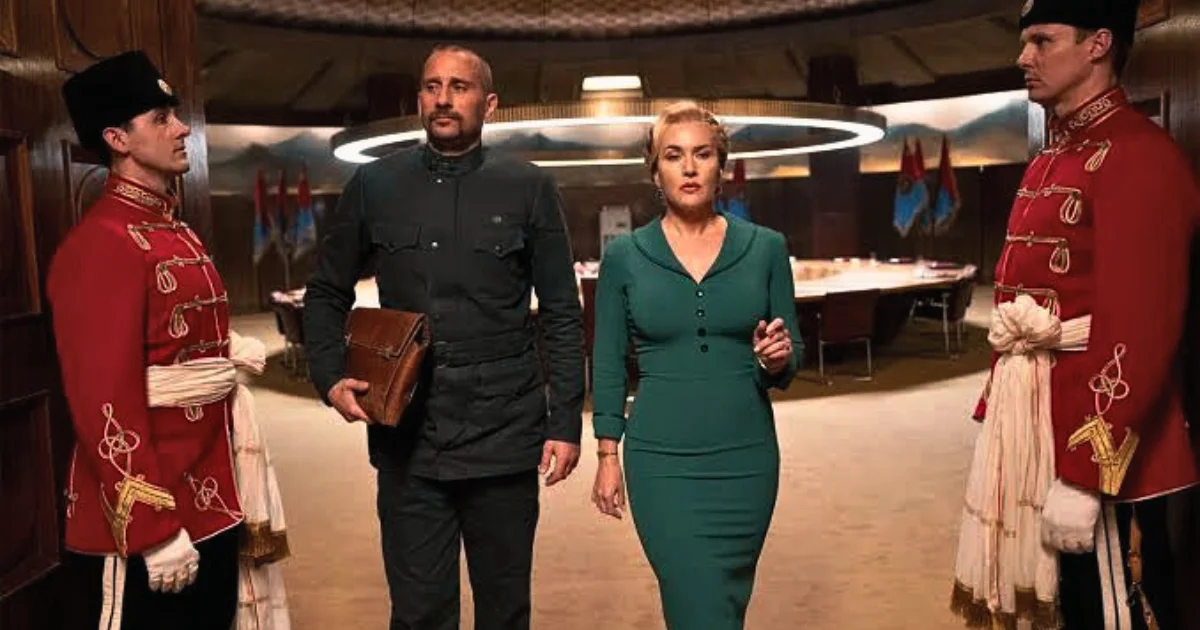The Real Meaning of The Regime Ending Explained: There Are No Heroes in the World of Politics
The Regime Ending Explained leaves a bitter taste in viewers’ mouths. While the series explores themes of power, revolution, and the human condition, the finale doesn’t offer easy answers. Let’s delve deeper into the show’s closing moments and what they truly mean.
Why Elena Sacrifices Herbert In The Regime Ending
Chancellor Elena Vernham’s ruthless act of sacrificing her lover, Herbert Zubak, is a pivotal moment in the finale. Escaping the siege on the palace, Elena needs American support to regain control. However, the US demands a leader who can maintain stability, not a firebrand like Zubak. Elena, consumed by her thirst for power, betrays Herbert, ensuring his death.
This act reveals several crucial points:
- Elena’s Lack of Growth: Despite facing rebellion and personal turmoil, Elena remains unchanged. Her desire for control trumps love and compassion.
- The Price of Power: Elena’s ascent back to leadership comes at a devastating cost. She sacrifices those closest to her to maintain her grip on authority.
- Pragmatism Over Morality: The power struggle transcends emotions. Elena demonstrates a willingness to do whatever it takes, regardless of the moral implications.
Why America Rescues Elena From The National Freedom Front (NFF)
America’s decision to support Elena, despite the brutality of her regime, highlights the prioritization of self-interest over human rights. The US likely sees Elena as the best option to ensure:
- Economic Stability: Elena’s regime likely serves American economic interests. A stable, pro-US government promotes easier access to resources and trade.
- Containing the Rebellion: The NFF’s victory would likely lead to further instability. The US might fear a domino effect across the region.
- Maintaining Power Dynamics: Helping Elena reaffirms American influence in the region. This discourages other powers from stepping in and potentially challenging American dominance.

Nick and Elena Reunion Explained
Elena’s reunion with her estranged husband, Nick, further emphasizes the show’s bleak outlook. Nick, initially ostracized by Elena’s transformation, ultimately accepts her return to power. This reconciliation can be interpreted as:
- The Cycle of Power: Nick’s acceptance implies a return to the status quo. The power dynamic between husband and wife remains unchanged.
- Love vs. Ambition: Despite the hurt and betrayal, Nick ultimately prioritizes saving his marriage over opposing Elena’s ambitions.
- The Price of Peace: Nick’s acceptance represents a desire for stability, even if it comes at the cost of personal happiness.
What Happened To Oskar In The Regime’s Ending
The fate of Agnes’ son, Oskar, remains a mystery. Agnes, leader of the NFF, is presumed dead after the failed palace siege. Without Agnes, Oskar’s future is uncertain. This ambiguity underscores the show’s theme of:
- The Cost of Revolution: Revolutions often claim unintended victims. Oskar’s potential loss symbolizes the innocent caught in the crossfire.
- The Cycle of Violence: The unknown fate of Oskar implies that the struggle might continue, potentially leading to another generation of revolutionaries.
- A Lack of Closure: The series leaves viewers to ponder the future of the country and the characters, reflecting the real world’s messy political realities.
The 9th “Victory Day” Proves Nothing Really Changed
Elena’s public address on the 9th “Victory Day” further solidifies the depressing nature of the conclusion. The lavish spectacle celebrates a hollow victory. Here’s why:
- The Illusion of Triumph: The “victory” commemorates the suppression of the rebellion, not any real progress. The underlying issues remain unaddressed.
- The Insulated Leader: Elena delivers her address through a bulletproof barrier, highlighting the ongoing distrust between her and the people.
- A Symbolic Replacement: Elena replacing her father’s decaying corpse with Herbert’s signifies the continuation of a brutal regime, only with a new enforcer.

The Real Meaning of The Regime Ending Explained: There Are No Heroes in the World of Politics
The Regime’s ending offers no easy answers or heroic figures. Instead, it presents a cynical view of power politics.
- Power Corrupts: The series highlights how power corrupts even those with good intentions. Elena’s descent into tyranny serves as a cautionary tale.
- Self-Interest Prevails: The actions of major players, be it Elena, the US, or Nick, are all driven by self-interest. The well-being of the people is a secondary concern.
- No Easy Answers: The show avoids simplistic narratives and refuses to paint any character as a clear hero or villain. Everyone is flawed and motivated by their own desires.
- The Cycle Continues: The ending suggests that the fight for power is a never-ending cycle. The failed rebellion might lead to the rise of new resistance movements, perpetuating the violence.
- A Reflection of Reality: The show’s cynicism regarding politics mirrors the complexities of the real world. There are often no easy solutions, and moral compromises are often made in the pursuit of power.
Will There Be a Season 2 of The Regime?
As of now, there is no official confirmation of a second season for The Regime. The show was initially conceived as a miniseries, and creator Will Tracy has expressed no plans for further episodes. However, there are a few things to consider:
- Limited Series with Open Endings: While the miniseries format suggests a complete story arc, the ending leaves several plot threads unresolved. This ambiguity could pave the way for a potential continuation.
- Critical Reception and Audience Response: Strong positive reception, both critically and from viewers, could potentially influence HBO’s decision to revisit the world of The Regime.
- Shifting Show Formats: There have been instances where miniseries have been revived for additional seasons due to unexpected popularity.
Looking Ahead: Potential Storylines for Season 2
Despite the lack of confirmation, here are some potential storylines that could be explored in a hypothetical season 2:
- The Uprising’s Aftermath: Season 2 could delve deeper into the consequences of the failed rebellion. A fractured nation could see the rise of new resistance movements or a tightening of Elena’s grip on power.
- Oskar’s Fate: The ambiguous fate of Oskar presents an opportunity to explore the impact of the revolution on the next generation. Oskar could become a symbol of continued resistance or be indoctrinated into the new regime.
- Nick’s Disillusionment: Nick’s strained relationship with Elena could deteriorate further as he grapples with the realities of her rule. This could lead to internal conflict within the regime.
- The Geopolitical Landscape: The role of other world powers in the region could be explored in more detail. A potential power struggle between the US and other nations could further destabilize the fictional European country.
Netflix Ripley Season 1 Ending Explained | Why is Ripley in Black and White?
Conclusion
The Regime’s ending provides a thought-provoking exploration of power, politics, and the human condition. While the lack of clear-cut heroes and the bleak outlook might leave viewers feeling unsatisfied, it compels them to question the true nature of power and the sacrifices made in its pursuit. Whether or not a second season emerges, The Regime serves as a powerful commentary on the complexities of the political world.
